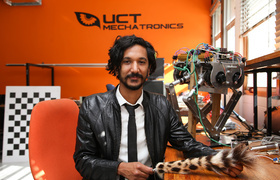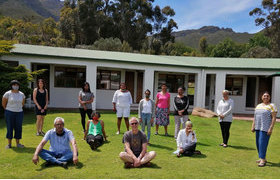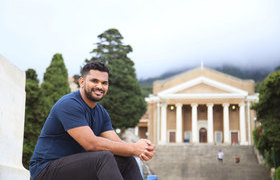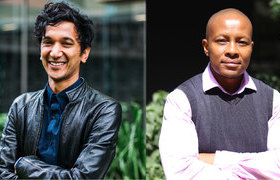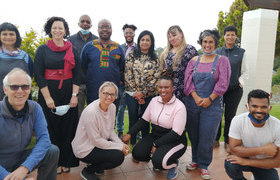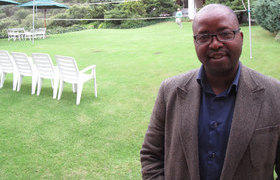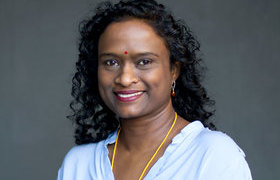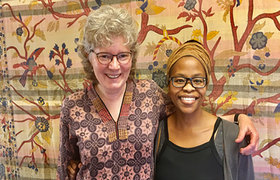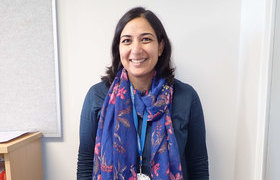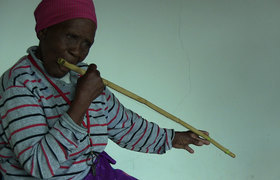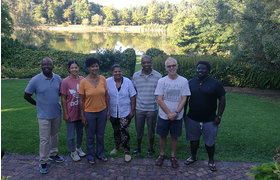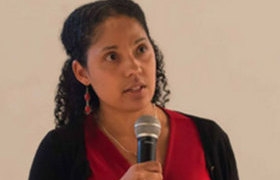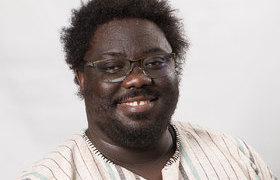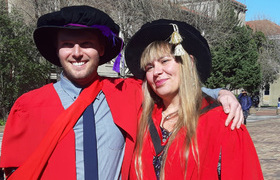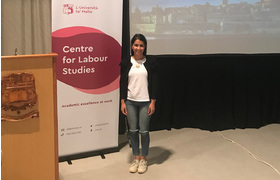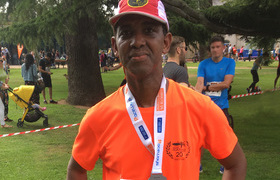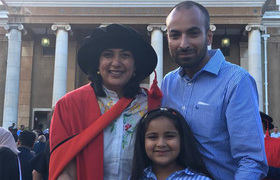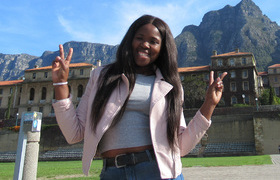‘I want to reach the places my father did not’
10 December 2018 | Story Carla Bernardo. Photo Je’nine May. Read time 7 min.
Tafadzwa Mushonga’s path towards being the first PhD graduate from the Centre for Environmental Humanities South has involved setbacks and perseverance – much as learning to ride a bicycle does. Indeed, learning to cycle was part of her journey towards her graduation on 14 December at the University of Cape Town (UCT).
Recalling her time at Wageningen University in the Netherlands where she obtained a master’s degree (MSc Forest and Nature Conservation), Mushonga says that is where she also got to grips with the quintessential Dutch mode of transport, in 2010.
“You know how it is, learning when someone is pushing you from behind and you are falling,” she laughed.
But soon, by applying the same focus that has seen her succeed on her academic journey, Mushonga was cycling to campus each day. Even in winter, as the snow fell, she was on her bike alongside her peers, risking a fall on the icy surface.
“I fell so many times but that was part of the learning process.”
Falling and persevering
That perseverance and understanding of “falling” has stood her in good stead through tough times and setbacks. A big blow came early in her academic career when she suffered the loss of her role model, her father.
“My dad was the one who inspired me the most,” she said.
He was a science teacher who was appointed as the pioneer principal of the first government school in the Mzarabani District in Zimbabwe in the early 1990s. It was a proud moment in the life of a man nicknamed “Genius” by his peers.
Mushonga’s mother was also a community leader. She returned to school to further her education, a step towards her promotion to head sister at the local clinic.
“Both of them were people who really valued education … who knew the importance of education.”
“I could have given up when I lost my parents, but I didn’t because I knew what I wanted.”
Her parents ensured that Mushonga – the first born – and her four siblings all attended the best schools they could afford. Now, each one of them is a university graduate, inspired by a father who was the first in his family to successfully pursue a tertiary education.
His death in 2006 was followed five years later by the loss of her mother.
Mushonga, who had been unable to visit her mother before she died, was devastated. But, after acknowledging where the losses had taken her, she persevered.
“I could have given up when I lost my parents,” she said.
“But I didn’t because I knew what I wanted.”
What she wanted was to go where her father had not, and reach new academic heights. And that’s exactly where she has directed her journey – through sacrifices, and with perseverance and focus.
A dream comes true
After completing her master’s, Mushonga returned to Zimbabwe but was always looking for opportunities to further her education.
Then, on Christmas Day in 2014, she received an email from the Andrew Mellon Foundation. She had applied for PhD funding for research into the militarisation of conservation.
The first word she saw was “Congratulations”.
“I just threw my phone, woke up my daughter and I was jumping up and down and screaming,” she recalled.
“It was like a Christmas present!”
It was a gift she had long dreamt of. When she completed her A levels, Mushonga had had her heart set on studying at UCT. She applied in secret, only informing her family when the prospectus arrived.
“My dad just looked at the prospectus and [put it aside] because obviously he knew we could not afford UCT.”
So many years later, with funding from the Mellon Foundation and the Canon Collins Educational and Legal Trust, Mushonga made it to UCT. She joined the pioneer group at the Centre for Environmental Humanities South under the supervision of Associate Professor Frank Matose.
“It just felt great that finally, finally I am at UCT.”
“I really wish my dad was around to show him I made it to UCT,”
Risks and research
Her research into the militarisation of conservation was a continuation of her work at Zimbabwe’s Forestry Commission. One half of her research on the ground entailed four months with affected communities, the other was spent working with forest guards who patrolled the Hwange National Park in search of illegal activity such as poaching.
For four months, she joined the patrols, travelling some 30 kilometres a day.
“It was risky, but it was interesting, and I learnt a lot.”
Taking that risk has paid off. As well as being the first doctoral candidate from the Centre for Environmental Humanities South, Mushonga will be the first PhD graduate in her family.
“I really wish my dad was around to show him I made it to UCT,” she said.
Fortunately, her paternal grandmother is always reminding her of how she has followed in her father’s footsteps.
“Whenever my grandmother talks about us and school, she always refers to my dad,” said Mushonga. She tells her grandchildren how she “decided not to buy shoes and instead paid school fees” because their father was so intelligent.
As for being the first PhD graduate from the centre, Mushonga said it is a proud moment.
“When you are doing it, it is painful but when you are done, you look back and realise you made it.”
The rest of the ride
Mushonga’s next stop on her journey remains undecided. But, postdoctoral research is certainly a goal. She is also co-authoring a chapter on militarisation of conservation alongside Matose and Professor Maano Ramutsindela. This will form part of the required outputs of the Mellon Foundation.
But for now, after so much time apart, Mushonga is looking forward to seeing her 14-year-old daughter who is travelling from Zimbabwe to attend her mother’s graduation this week.
And just like her father, she wants her daughter to push past her own achievements.
“You need to work hard so you can take your children to greater places,” said Mushonga.
 This work is licensed under a Creative Commons Attribution-NoDerivatives 4.0 International License.
This work is licensed under a Creative Commons Attribution-NoDerivatives 4.0 International License.
Please view the republishing articles page for more information.
Next Generation Professoriate (NGP)
The Next Generation Professoriate (NGP) is a mid-career academic staff development and support programme. Funded by the vice-chancellor’s Strategic Funds, the NGP addresses demographic inequalities in the academic hierarchy. The goal is to help members become associate and full professors.
The NGP was officially launched in September 2015. By the end of 2018, four of its members had been promoted to full professor and a further 14 had reached the rank of associate professor.
The programme is led by Dr Robert Morrell, who has over 35 years of academic experience in South African universities. He has a B1-rating from the the National Research Foundation (NRF) and is an elected member of the Academy of Sciences in South Africa.
Newsletters
In the news
